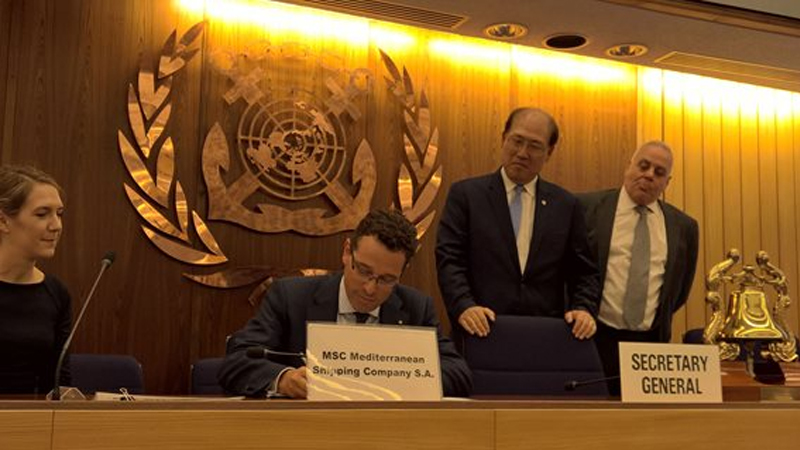The MSC Group, a leading international transport conglomerate, has joined, as one of the thirteen founding members, the ‘Global Industry Alliance’ (GIA), a new IMO public-private initiative which aims to support the actions undertaken by the shipping sector and its related industries toward a low-carbon future.
Together, the GIA partners will collectively identify and develop innovative solutions to address common barriers to the uptake and implementation of energy efficiency technologies and operational measures. Focusing on a number of priority areas including energy efficiency technologies and operational best practices, alternative fuels, and digitalization. Activities likely to be undertaken or promoted by the alliance will include: research and development; showcasing of advances in technology development and positive initiatives by the maritime sector; industry fora to encourage a global industry dialogue; and the implementation of capacity building and information exchange activities.
The GIA was officially inaugurated at a launch ceremony held at the headquarters of the IMO, the United Nations specialized agency with responsibility for safety and security of shipping and the prevention of pollution from ships. The launch was held on the margins of the first meeting of the IMO Intersessional Working Group on Reduction of GHG emissions from ships. MSC Group was represented by Claudio Bozzo (pictured), Chief Operating Officer, at the launch ceremony and the subsequent working group.
Diego Aponte, MSC’s President and CEO, said: “I am extremely proud to confirm MSC’s participation in this initiative that we consider extremely important - both for our cargo and passenger divisions.”
“As a leading international company, it is our responsibility to take an active role in the international policy dialogue and further strengthen our collaboration with the IMO and its stakeholders.”
He added: “Our Group strategy focuses on the continuous improvement of our environmental performance. We firmly believe that this initiative led by the IMO can make a tangible impact on the long-term sustainability performance of our industry.”
MSC’s significant investments in the environment and green technologies show the Group’s commitment toward a cleaner planet and a healthier supply chain.
In 2016, MSC Cargo reduced its CO2 emissions by 6.6% per cargo-ton-mile. This reduction was achieved through many activities, including a $250 million investment in vessel retrofitting.
Earlier this year, MSC Cruises announced a multi-billion Euro commitment to develop and build its new "World Class" ships with LNG propulsion. This initiative is expected to produce ships with approximately 20% lower carbon emissions when compared with conventional cruise ships of a similar size.
Following the announcement by the GloMEEP Project of its intention to establish the GIA, thirteen companies have agreed to become the founding members of the GIA, although it is expected that more companies may join the GIA even after the launch. The thirteen founding members that have formally committed to become founding members of the GIA are:
ABB Engineering (Shanghai) Ltd.; DNV GL SE; Lloyd's Register EMEA; MarineTraffic; MSC Mediterranean Shipping Company S.A.; Ricardo UK Ltd; Royal Caribbean Cruises Ltd.; Shell International Trading and Shipping Company Limited; Silverstream Technologies; Stena AB; Wärtsilä Corporation; Total Marine Fuels Pte Ltd; and Winterthur Gas & Diesel Ltd.
These companies are supporting the overall goals of the GIA by providing their expertise and know-how in the area of maritime fuel efficiency, as well as contributing financially towards the GIA Fund from which GIA activities will be funded.
By participating in the GIA, the members will jointly work towards addressing existing barriers and developing innovative solutions. The GIA partners will benefit from a wide network of understanding and experience, with all the synergies that can bring, and will also have direct access to all the tools and expertise developed by the GloMEEP Project.









